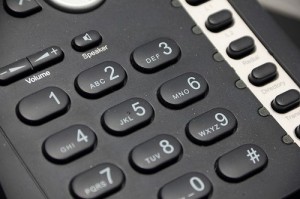Although you may have never heard of the term vishing, it’s one of the more common scams around. Vishing, or voice phishing, is yet another way for cyber criminals to acquire your personal information like social security and credit card numbers. So, how exactly does vishing work and in which ways can you avoid falling victim to the latest vishing scams?
How Does Vishing Work?

Image via Flickr by Hades2k
Often used in combination with VoIP (Voice over Internet Protocol) vishing is a type of phishing scam that takes advantage of the public’s trust when it comes to landline telephone services and automated messaging.
Much like email phishing, vishing criminals attempt to extract personal information from the public by posing as legitimate companies. Except, instead of sending emails, vishers place calls and leave messages asking for private information.
Widely used as a way to steal credit card information, vishing uses complex automated telephone systems that are capable of calling hundreds of numbers an hour. These automated call systems are difficult for authorities to track and trace.
Vishing Prevention
Luckily, there are a number of ways to avoid even the most sophisticated forms of vishing. As long as the public is aware of the techniques vishers use, they’ll be more likely to avoid the scam altogether.
Voice Phishing Awareness
As stated before, the first and best line of defense when it comes to vishing scams is awareness. By just realizing there is such thing as VoIP phishing scams makes you that much more capable of noticing potential threats.
In addition, spreading the word about vishing is an effective way to stop cyber criminals from further scam attempts. When the public’s informed, fewer people are likely to fall for the scam. And, the less effective the scam, the fewer criminals will attempt vishing others.
Keep Personal Information to Yourself
The reason vishing is so rampant is because the public is too easily duped into giving away private information. So, always use your best judgment when sharing your personal information – especially over the phone.
For example, if you receive a message from your bank asking you to verify your credit card number or pin over the phone, call the bank directly. Or, better yet, go to your bank in person. Messages asking for personal information are definitely red flags.
Update Your PBX
When it comes to stopping the threat at its source, your PBX, or private branch exchange, should be well equipped with the most up-to-date vishing filters and detection software. A quality PBX will detect any suspicious calls, track repeated numbers, and extinguish any phishing threats before they’re a problem.
Stay Educated on the Issue
Whether you’re part of a larger organization or use VoIP for your home landline, it’s always a good idea to keep updated and educated on vishing scam attempts as they likely change on a daily basis.
If you’re looking for more info on vishing, there are plenty of websites with up-to-date information on all things concerning voice phishing. These websites include detection practices as well as how to bring these vishing cyber culprits to justice.
The next time you receive a suspicious message through your VoIP, play it safe by keeping your personal information to yourself.

